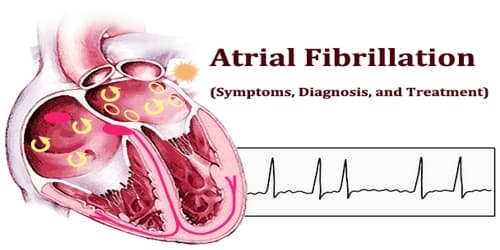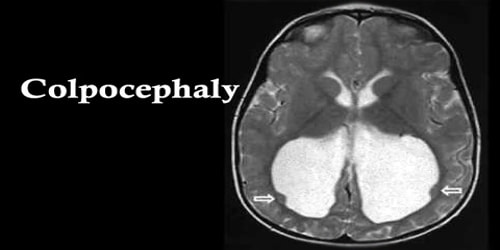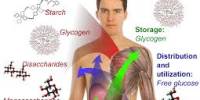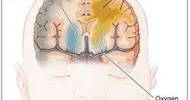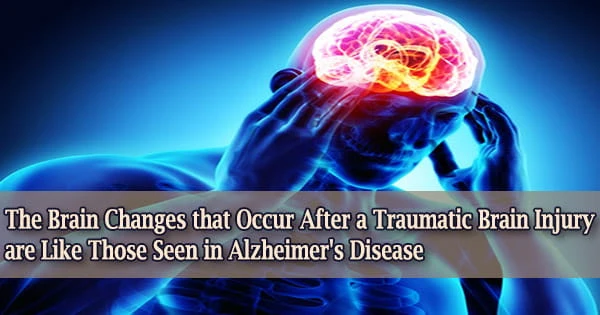Atrial fibrillation (Symptoms, Diagnosis, and Treatment)
Definition: Atrial fibrillation (also called AFib or AF) is one of the most common types of arrhythmias, which are irregular heart rhythms. Atrial fibrillation causes the heart to beat much faster than normal, and the upper and lower chambers of the heart do not work together. It is an irregular and often rapid heart rate that can increase our risk of stroke, heart failure, and other heart-related complications.
During atrial fibrillation, the heart’s two upper chambers (the atria) beat chaotically and irregularly — out of coordination with the two lower chambers (the ventricles) of the heart. Atrial fibrillation symptoms often include heart palpitations, shortness of breath and weakness.
Atrial fibrillation (AF) can decrease the heart’s pumping ability. The irregularity can make the heart work less efficiently. In addition, atrial fibrillation that occurs over a long period of time can significantly weaken the heart and lead to heart failure. AF is associated with an increased risk of stroke, heart failure, and even death.
A diagnosis is made by feeling the pulse and may be confirmed using an electrocardiogram (ECG). A typical ECG in AF shows no P waves and an irregular ventricular rate. Although atrial fibrillation itself usually isn’t life-threatening, it is a serious medical condition that sometimes requires emergency treatment.
Sometimes atrial fibrillation goes away on its own. For some people, atrial fibrillation is an ongoing heart problem that lasts for years. Over time, it may happen more often and last longer. Treatment restores normal heart rhythms, helps control symptoms, and prevents complications. The doctor may recommend medicines, medical procedures, and lifestyle changes to treat the patient’s atrial fibrillation.
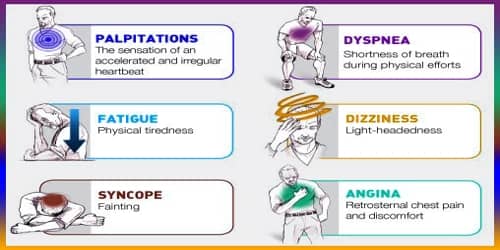
Signs and Symptoms of Atrial fibrillation: Atrial fibrillation (AF) is usually accompanied by symptoms related to a rapid heart rate. Rapid and irregular heart rates may be perceived as palpitations or exercise intolerance and occasionally may produce anginal chest pain (if the high heart rate causes ischemia).
Some people with atrial fibrillation have no symptoms and are unaware of their condition until it’s discovered during a physical examination. If people have heart disease that is worsening, they may notice more symptoms of atrial fibrillation. Those who do have atrial fibrillation symptoms may experience signs and symptoms such as:
- Palpitations, which are sensations of a racing, uncomfortable, irregular heartbeat or a flip-flopping in our chest
- Weakness
- Reduced ability to exercise
- Fatigue
- Lightheadedness
- Dizziness
- Confusion
- Shortness of breath
- Chest pain
If people’s atrial fibrillation is undetected or left untreated, serious and even life-threatening complications can arise. They include stroke and heart failure. AF may be related to alcohol or excessive caffeine use, stress, certain drugs, electrolyte or metabolic imbalances, severe infections, or genetic factors. In some cases, no cause can be found.
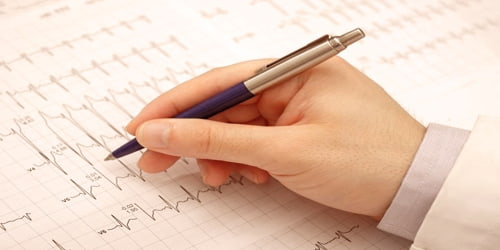
Diagnosis and Treatment of Atrial fibrillation: To diagnose atrial fibrillation, the doctor may review the patient’s signs and symptoms, review their medical history, and conduct a physical examination. The doctor may order several tests to diagnose the patient’s condition, including:
- Blood tests
- Echocardiography
- Electrocardiogram (ECG)
- Holter monitor
- Event recorder
- Stress test
- Chest X-ray
Transesophageal echocardiography (TEE) to detect blood clots that may be forming in the heart’s upper chambers because of atrial fibrillation. It uses sound waves to take pictures of the patient’s heart through the esophagus.
Walking test to measure people’s heart activity while they walk for six minutes. This can help determine how well their body can control their heart rate under normal circumstances.
The main goals of treatment are to prevent circulatory instability and stroke. Rate or rhythm controls are used to achieve the former, whereas anticoagulation is used to decrease the risk of the latter. If cardiovascularly unstable due to uncontrolled tachycardia, immediate cardioversion is indicated. Regular, moderate-intensity exercise is beneficial for people with AF.
Many options are available to treat atrial fibrillation, including lifestyle changes, medications, catheter-based procedures, and surgery. The type of treatment that is recommended for people is based on their heart rhythm and symptoms.
Anticoagulation can be used to reduce the risk of stroke from AF. Anticoagulation is recommended in most people other than those at low risk of stroke or those at high risk of bleeding. Anticoagulation can be achieved through a number of means including warfarin, heparin, dabigatran, rivaroxaban, edoxaban, and apixaban. Initially, medications, are used to treat atrial fibrillation. Medications may include:
- Dofetilide (Tikosyn)
- Flecainide
- Propafenone (Rythmol)
- Amiodarone (Cordarone, Pacerone)
- Sotalol (Betapace, Sorine)
Rate control to a target heart rate of fewer than 110 beats per minute is recommended in most people. Lower heart rates may be recommended in those with left ventricular hypertrophy or reduced left the ventricular function. Rate control is achieved with medications that work by increasing the degree of the block at the level of the AV node, decreasing the number of impulses that conduct into the ventricles.
When medications do not work to correct or control atrial fibrillation, or when medications are not tolerated, a procedure may be necessary to treat the abnormal heart rhythm, such as: electrical cardioversion, pulmonary vein antrum isolation procedure, ablation of the AV node followed by pacemaker placement, or surgical ablation (Maze procedure or minimally invasive surgical treatment).
The doctor may recommend a procedure or surgery, especially if lifestyle changes and medicine alone did not improve a patient’s symptoms. Typically, the doctor will consider a surgical procedure to treat their atrial fibrillation only if they will be having surgery to treat some other heart condition.
Information Source:
